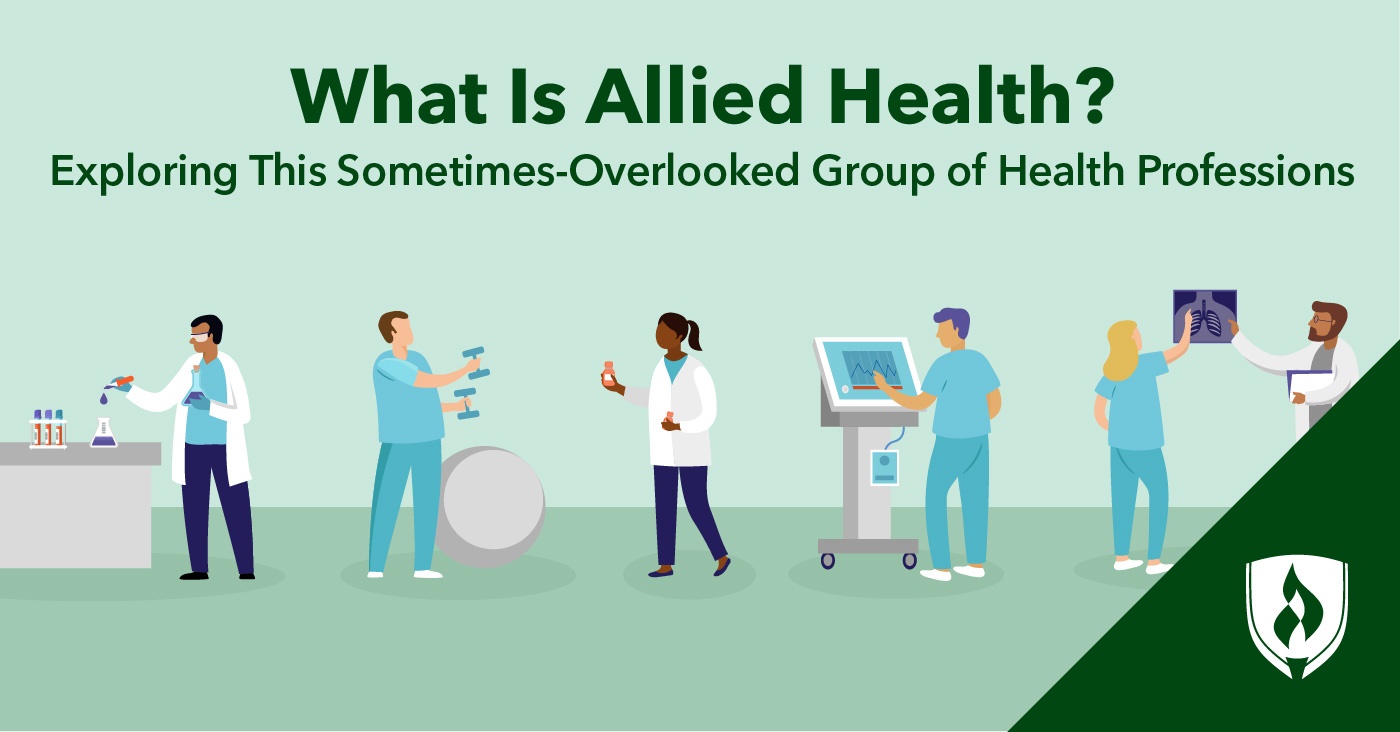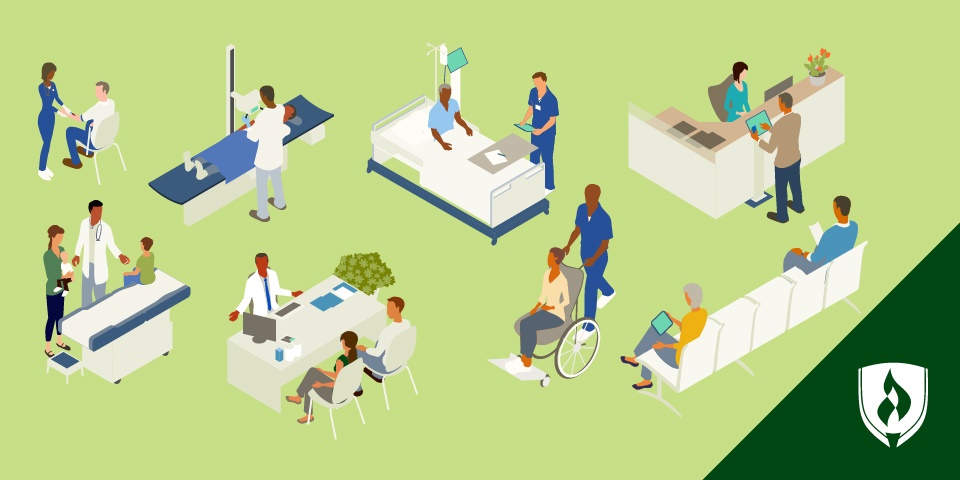What Is Allied Health? Exploring This Sometimes-Overlooked Group of Health Professions
By Will Erstad on 05/17/2021

Ask practically any seven-year-old to explain who works at a hospital or clinic, and you’re likely to get one of two answers: doctors or nurses!
While that’s demonstrating a pretty solid grasp of the healthcare field for a child, in reality there’s a huge number of important healthcare professionals who aren’t doctors and nurses. Many of these not-so-obvious healthcare roles are classified as “allied health” professionals—and they can be appealing options for anyone plotting their potential next steps toward a career in the field.
In this article, we’ll dive into what allied health is, the types of occupations that fall under the umbrella of allied health and some of the top reasons for considering an allied health career. Let’s get right to it.
What is allied health?
Roughly defined, allied health refers to a broad group of healthcare professionals who are responsible for the administration of healthcare as well as the support systems surrounding healthcare providers. The exact definition of what’s included as an allied health profession will depend on the country you live in. In the United States, there is a legal definition of what constitutes an allied health professional. To summarize, this includes any health professional (other than a registered nurse or physician assistant) who:1
- Has received postsecondary education or training ranging from a certificate program to a doctoral degree in a science relating to healthcare
- Shares in the responsibility for the delivery of healthcare or related services (including health promotion, rehabilitation services, dietary and nutrition services, public health preventative services, and management of health systems)
This excludes a variety of healthcare practitioners who’ve earned a doctoral degree—like medical doctors, dentists, optometrists and more.1 This definition covers a wide array of important roles that make up a sizable portion of our healthcare system, and in turn, our economy.
What are some examples of allied health careers?
Now that you know the guidelines for what’s considered an allied health professional, you might be wondering what roles specifically fit the bill. The following is a (non-comprehensive) list of allied health careers:
- Audiologists
- Community health workers
- Dietitians
- Emergency medical technicians
- Health information technicians
- Medical assistants
- Medical laboratory technicians
- Medical transcriptionists
- Pharmacy technicians
- Physical therapists
- Physical therapist assistants
- Radiographers
- Radiologic technologists
- Speech language pathologists
- Surgical technologists
Most of these require specialized healthcare training and knowledge that focuses on a specific subdomain—like physical therapy, diagnostic imaging, health information management and so on. All of these potential allied health career paths have their own pros and cons, so it’s worth taking the time to consider your options.
Why pursue an allied health career?
So what makes pursuing an allied healthcare position an appealing option? While obviously your individual priorities and preferences may vary, there are a few very solid reasons to keep an allied health career on your radar.
1. The healthcare field is growing
If you’re going to invest the time, effort and money into pursuing a healthcare-related education, it’s only natural to want to seek out a career field with some long-term stability. Healthcare is an excellent position overall. The Bureau of Labor Statistics (BLS) projects that employment of healthcare occupations will grow 15 percent from 2019 to 2029.2 This projection amounts to roughly 2.4 million healthcare jobs over that timeframe, which is more than any other occupation group.2
There are several factors at the heart of this strong growth projection, and one of the primary drivers among them is the United States’ large baby boomer generation aging out of the workforce and into the age bracket that uses the most healthcare services. This means employers need to find ways to replace members of their existing workforces while preparing for the additional demand that comes with such a large cohort of people reaching an advanced age.
2. Your work makes a difference
There are plenty of jobs out there that offer very little fulfillment beyond a steady paycheck. That’s fine for some, but many prefer a job that is tied to supporting some sort of higher purpose or noble cause. Allied healthcare careers are either directly or indirectly tied to maintaining and improving the health of others.
Knowing that, on any given day, you can be helping a sick patient get clarity on what’s ailing them, guiding their rehabilitation or ensuring their billing paperwork is properly processed can help make your daily work routine more engaging. In fact, a Gallup Workplace report on employees who demonstrate high levels of engagement and well-being are 42% more likely to evaluate their overall lives highly.3 Simply put, an engaging job that provides a sense of purpose can have some serious upsides.
3. You can find a niche with less “ick”
There’s no sugarcoating it—some healthcare jobs can be downright gross. Between bedpans, bandages and blood alone there’s plenty of not-so-pleasant things some healthcare professionals have to deal with as a part of their day-to-day work.
Fortunately, for the squeamish—or those who are otherwise uninterested in working directly with patients—there are career options within allied health that can keep the unpleasantness to a minimum. This includes medical administrative assistants, pharmacy technicians and health information professionals, to name a few.
4. Many allied health careers have lower barriers to entry
Given how long it takes to become a physician, you might assume most healthcare jobs will take a similarly long time to become qualified for. While some allied health roles can require a similar level of education and training as physicians, there are quite a few allied health professions that can have a much shorter education and training pathway than you might think.
Several allied health career paths typically require candidates to earn an Associate’s degree or less. This includes medical assistants, pharmacy technicians, physical therapist assistants, health information technicians, radiologic technologists, surgical technologists and more. That’s welcome news for anyone looking to get started quickly in a solid healthcare career.
Is an allied health career in your future?
Now that you have a better picture of what allied health is and the wide variety of potential career pathways tied to it, could this be the right fit for you? There’s a lot of opportunity in these somewhat under-the-radar healthcare roles, but you’ll likely need to do a little research to further narrow down your options. Our article “Exploring 12 Healthcare Jobs You Can Launch in 2 Years or Less” can provide an excellent starting point, particularly if you’re looking to get started in a new healthcare career as soon as possible.
142 U.S. Code § 295p – Definitions (2014) [accessed April, 2021] https://www.law.cornell.edu/uscode/text/42/295p
2Bureau of Labor Statistics, U.S. Department of Labor, Occupational Outlook Handbook, [career information accessed April, 2021] https://www.bls.gov/ooh/healthcare/home.htm . Information represents national, averaged data for the occupations listed and includes workers at all levels of education and experience. This data does not represent starting salaries. Employment conditions in your area may vary.
3Dan Winters and Sangeeta Agrawal,“Well-Being Enhances Benefits of Employee Engagement” Gallup Workplace, October 27, 2015 [accessed April, 2021] https://www.gallup.com/workplace/236483/enhances-benefits-employee-engagement.aspx

-(1).png)


